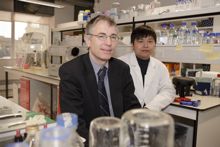2010 Press Releases
23.04.2010
Scientists at University College Cork (UCC) and the University of Kent, UK have shown that simple bacteria can be manipulated and modified to produce biofuels and medicines and help reduce our over-reliance on oil derived products.
The research (funded by Science Foundation Ireland, and the UK Biotechnology and Biological Sciences Research Council) is published today (Friday, 23 April) in the academic journal, Molecular Cell.
“The way it works is that bacteria can be manipulated to construct internal pockets inside themselves that work as mini factories (bioreactors) where biofuels and medicines could be produced,” says Professor Michael Prentice, Professor of Medical Microbiology at UCC. At present oil and oil derived products are used in manufacturing medicines and precursors for plastics and it is envisaged that the bacteria compartments could be modified for the synthesis of ethanol or even hydrogen gas which could reduce our need for oil derived products.
“Using these compartments, simple bacteria like E.coli can make chemicals that would normally be deadly for them. The bacteria are partially protected because the chemicals are being made within compartments inside their cells. We are working on ways to use these ‘factories’ to produce substances that will kill other harmful bacteria,” says Professor Prentice.
Lead researcher at the University of Kent Professor Martin Warren said: “Synthetic biology is really exciting because we can produce some important and useful products that can be difficult and expensive to make using traditional chemistry techniques. Bacteria can make these things very easily and in large quantities if we develop bacteria with the right characteristics to do so efficiently. What we can do is to make sure that the desired product is made within one or more tiny compartments that already exist inside the bacteria. This means that the process doesn’t get caught up or slowed down by everything else that is going on in the cell and so is much more efficient.”
The researchers at UCC and the University of Kent have been able to get bacteria to make bespoke compartments within the cell that take up about 70% of the available space and can all be used to assemble proteins and make a range of various chemical compounds. The next stage of the research will be to make new compartments in the bacteria that will have new functions.
This research was funded by Science Foundation Ireland in the Department of Microbiology at UCC, and the UK Biotechnology and Biological Sciences Research Council in the University of Kent, Canterbury, UK. Professor Prentice, who is in the Departments of Microbiology and Pathology at UCC, was Principal Investigator in Cork while Professor Warren was lead investigator in Canterbury.
Picture L-R: Professor Michael Prentice, UCC Principal Investigator and Dr Mingzhi Liang, a researcher on the project.
RMcD

